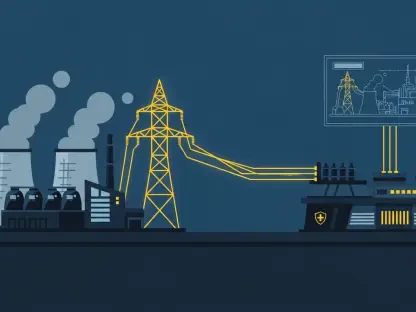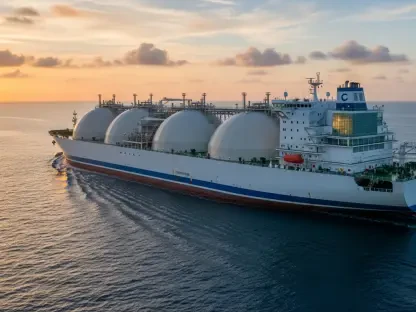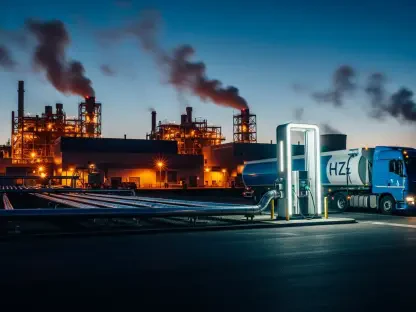In an era where the maritime industry faces mounting pressure to adopt sustainable practices, the challenge of transitioning to alternative fuels like LNG, ammonia, methanol, and LPG has become a critical focus for shipowners worldwide. Environmental regulations and the urgent need to reduce carbon footprints have pushed the sector to explore innovative solutions that can handle diverse fuel types without compromising efficiency or safety. Amid this backdrop, DESMI, a leader in marine engineering, has introduced a groundbreaking solution with the DesFuel Deepwell Pump. This advanced marine fuel pump is designed to address the technical limitations of traditional systems, offering unprecedented flexibility to accommodate a variety of alternative fuels. With features that enhance operational efficiency and reduce maintenance burdens, this development marks a significant step forward in supporting the industry’s shift toward greener practices. The pump’s innovative approach promises to redefine fuel handling on vessels of all sizes, setting a new standard for adaptability in marine technology.
Addressing Fuel Flexibility Challenges
The maritime sector’s pivot to alternative fuels has exposed significant shortcomings in conventional fuel pump designs, which often struggle with the unique properties of volatile substances like ammonia or methanol. The DesFuel Deepwell Pump emerges as a tailored response to these issues, engineered from scratch to ensure compatibility with a broad spectrum of fuel types. One of its standout attributes is the strategic placement of essential components outside the fuel tank. This design not only simplifies access for maintenance but also cuts down on costs by eliminating the need for specialized materials or expertise. Furthermore, it minimizes heat transfer into the tank, reducing the occurrence of boil-off gas—a persistent problem with volatile fuels. Such thoughtful engineering underscores a commitment to practicality, ensuring that shipowners can adopt sustainable fuels without facing operational setbacks or excessive expenses during regular upkeep.
Beyond component placement, the pump introduces a revolutionary approach to maintenance that sets it apart from traditional systems. By installing the pump within a caisson pipe that can be isolated from the fuel tank, repairs and servicing can be conducted without the cumbersome and costly process of gas-freeing. This feature translates to substantial time savings, allowing vessels to remain operational with minimal downtime. Additionally, the pump operates without filters, relying instead on an air-cooled motor and oil-lubricated main bearing. This eliminates the risk of clogging, a common issue that plagues conventional pumps and often leads to unexpected interruptions. The result is a system that prioritizes reliability and efficiency, catering to the real-world demands of maritime operations where every minute of uptime counts. This innovation reflects a deep understanding of the industry’s pain points and offers a robust solution for navigating the complexities of alternative fuel adoption.
Enhancing Efficiency and Versatility
Efficiency remains a cornerstone of the DesFuel Deepwell Pump’s design, achieved through cutting-edge technology and meticulous engineering. Utilizing advanced computational fluid dynamics (CFD) tools, the pump has been optimized for a low Net Positive Suction Head required (NPSHr), ensuring effective performance even when fuel tank levels are minimal. This capability enhances usability across various operational scenarios, making it a practical choice for vessels of differing sizes and requirements. Available in five distinct sizes, the pump caters to a wide range of vessel types, while its expansive operating window accommodates fluctuating engine loads with ease. By reducing the need for fuel recirculation, it further minimizes boil-off gas, contributing to both energy efficiency and environmental benefits. Such adaptability positions this pump as a versatile asset for shipowners aiming to balance performance with sustainability goals in an evolving industry landscape.
Drawing on nearly three decades of expertise with cargo gas pumps, DESMI has infused the DesFuel Deepwell Pump with proven reliability and modern innovation. Manufactured at a state-of-the-art facility in China, the pump embodies a fusion of historical know-how and contemporary engineering prowess. Its design not only addresses current needs but also anticipates future challenges as the maritime sector continues to diversify its fuel sources. The emphasis on operational flexibility ensures that vessels equipped with this pump can seamlessly adjust to varying conditions without sacrificing performance. This forward-thinking approach highlights the importance of scalable solutions in an industry where regulatory and environmental demands are constantly shifting. Shipowners gain a competitive edge with a system that promises longevity and adaptability, paving the way for smoother transitions to alternative fuels over the coming years.
Pioneering Sustainable Maritime Solutions
Reflecting on the strides made by DESMI, the introduction of the DesFuel Deepwell Pump stands as a pivotal moment in marine fuel technology. Its ability to handle a diverse array of alternative fuels while tackling key operational hurdles like maintenance costs and downtime proves transformative. The thoughtful design elements, from external component access to filter-free operation, demonstrate a clear focus on practicality and efficiency. Looking ahead, the maritime industry can take actionable steps by integrating such innovative technologies into fleet upgrades, ensuring compliance with stringent environmental standards. Collaborations between technology providers and shipowners could further accelerate the adoption of sustainable fuels, addressing lingering challenges through shared expertise. As the sector moves forward, solutions like this pump will likely inspire additional advancements, fostering a future where adaptability and sustainability go hand in hand in shaping maritime operations.









